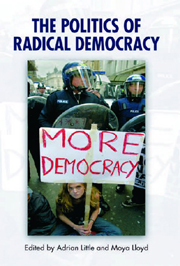Book contents
- Frontmatter
- Contents
- Acknowledgements
- Notes on the Contributors
- Introduction
- 1 Rhetoric and Radical Democratic Political Theory
- 2 Performing Radical Democracy
- 3 Aboriginal Sovereignty and the Democratic Paradox
- 4 Judith Butler, Radical Democracy and Micro-politics
- 5 Post-structuralism, Civil Society and Radical Democracy
- 6 Hegemony and Globalist Strategy
- 7 Is ‘Another World’ Possible? Laclau, Mouffe and Social Movements
- 8 Friends and Enemies, Slaves and Masters: Fanaticism, Wendell Phillips and the Limits of Agonism
- 9 The Northern Ireland Paradox
- Conclusion
- Bibliography
- Index
Conclusion
Published online by Cambridge University Press: 12 September 2012
- Frontmatter
- Contents
- Acknowledgements
- Notes on the Contributors
- Introduction
- 1 Rhetoric and Radical Democratic Political Theory
- 2 Performing Radical Democracy
- 3 Aboriginal Sovereignty and the Democratic Paradox
- 4 Judith Butler, Radical Democracy and Micro-politics
- 5 Post-structuralism, Civil Society and Radical Democracy
- 6 Hegemony and Globalist Strategy
- 7 Is ‘Another World’ Possible? Laclau, Mouffe and Social Movements
- 8 Friends and Enemies, Slaves and Masters: Fanaticism, Wendell Phillips and the Limits of Agonism
- 9 The Northern Ireland Paradox
- Conclusion
- Bibliography
- Index
Summary
The theories of radical democracy outlined, analysed and criticised in this book reflect a diverse body of thought. Radical democracy is characterised by its heterogeneity and, as a result, it invokes and embraces a politics of contingency and contestation. This makes it a fascinating object of study but also an elusive one. Radical democracy emphasises a vibrant, dynamic conception of politics that ensures that the object of analysis is never settled, uncontested or static. On this account the criticism that radical democracy does not spell out an institutional alternative to current or past forms of democratic politics misses the point; the theoretical foundations of the idea of radical democracy suggest that radical democracy can never be ‘achieved’. Rather, it thrives on the exposition of the exclusions, inequalities and injustices that have historically characterised democratic politics and which continue to do so. Thus, when we say that radical democratic politics can never be achieved, we simultaneously recognise that democracy can be more or less radical. Most of the theorists analysed in this book subscribe in one form or another to the view that a more radically democratic politics is possible through the process of exposing and challenging the exclusionary limits of mainstream democratic theory and practice. Nonetheless a more radical democratic politics is never conceived as the radical democratic politics because the methodological underpinnings of this theoretical stance imply that any political institutional arrangements need to be further contested to unveil exclusionary tendencies.
- Type
- Chapter
- Information
- The Politics of Radical Democracy , pp. 199 - 206Publisher: Edinburgh University PressPrint publication year: 2008



